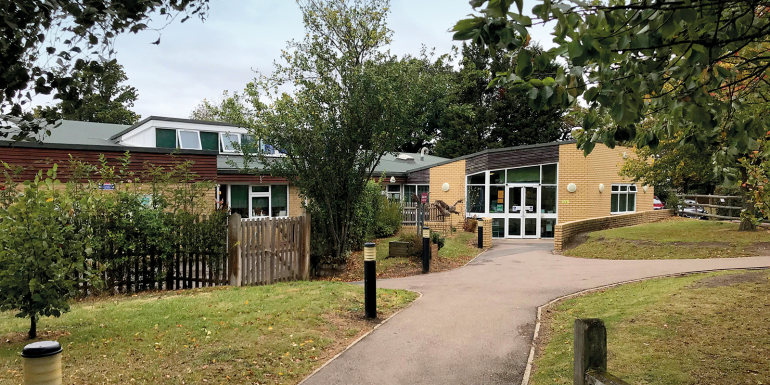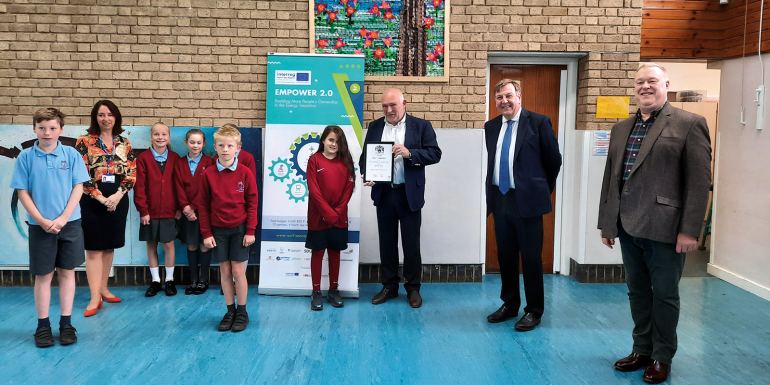CABE Sustainability Award

Highly commended, Danbury Park Primary School for its commitment to cleaner energy for future generations.
What began as a case study in Essex, the success of installing solar generation at the school, has led to an extended rollout including surrounding libraries and outdoor centres. Now in co-operation with Essex County Council and two universities, the project is proving a powerful awareness-generator on climate change and the importance of cleaner energy and less waste. This joint commercial/professional doctorial research project is data led and aims to equip the school with the ability to record real-time data that helps stakeholders be time and location specific with clearly defined attributable correlations.
Gary Hicks, a CABE Fellow member, had been working pro bono in schools to help reduce their electricity usage and waste before his granddaughter approached him and asked what could be done about her primary school. This led to the PrD research project as well as an infectious enthusiasm among teachers and students alike. Here is Danbury Park Primary School’s highly-commended entry.
Quality
The work undertaken at Danbury is a joint commercial/ PrD research project that provides a unique approach to carbon reduction in schools and businesses – in this case to analyse the level of stakeholder’s actions and contributions to energy management and sustainability within the school setting.
To date, research within the education sector predominately relies on consumption data provided by the supplier in the form of the fiscal charge. Here, we are collecting the data independently along with many other parameters, such as internal and external temperature, and building fabric and occupancy, and we are able to corelate actions taken to consumption changes to the minute. The ability to relay this information to the participants in real time retains and promotes their engagement in the project and the outcome. The data analysis relies on bespoke software, a site-specific Davis Vantage pro weather station feeding real-time data into the software and aerial point cloud surveying presented in Revit automated 5D BIM to provide data for computer modelling for the thermal efficiency of the fabric. By independently collecting and analysis the whole spectrum of data available, the correlation of action and outcome can be defined not assumed.

Schools can be leaders in reversing the effects of climate change, as Danbury Park demonstrates
Impact
The role of schools and business within the UK’s ambition to reach its 2050 net-zero goal is critical. While legislation and government action can be slow, schools, businesses and other stakeholders can act and be leaders in reversing the effects of climate change. Being part of a proven solution is a powerful position to be in, and Essex County Council (ECC) has committed to being the forefront in delivering this ambition by committing to becoming carbon neutral – and eventually carbon negative – by 2030.
In November 2019, Danbury Park Junior School in Essex became the case study in a PrD research project to understand the relationship between energy management and occupant behaviour. The project arose from the interest of the Year 3 pupils and their desire to understand more about climate change. The headteacher is actively encouraging this research and ensured that the pupils are included at all stages. Real-time energy metering has been installed and the results and analysis of the electrical usage are available to all the school’s occupants in a format relevant to their needs and understanding. As the data is real time, when actions or changes are implemented, the results can been seen and discussed. From the simple question from a Year 4 pupil “why is the kitchen so hot when we come into school?”, analysis of the data and a positive intervention from the catering staff produced a 11.9% reduction in consumption at peak demand period with no alteration to the day-to-day running of the kitchens.
Sustainability
In April 2000 The Carbon Trust was founded by the UK government to support businesses, governments and schools in realising ambitious plans for a sustainable and low-carbon future. In 2008 the Display Energy Certificate (DEC) scheme was implemented in the UK to raise awareness. Hong (2013) identified that carbon emissions from the school stock accounted for approximately 14% of emissions from the UK’s public sector and more robust strategies are required to reduce those outputs; further work in 2015 stated that the research “gave rise to concerns regarding the robustness of the benchmarks that underpin the DEC scheme”. Ouf (2016) states that school buildings contribute considerably to overall energy consumption due to their large number within the building stock, and Hogan (2018) identified that stakeholder engagement, lack of managers and cuts in funding were widespread barriers to sustainability, along with increased awareness.
Janda (2009) identifies that the role of people in energy use can be seen as being even more influential; in her paper entitled Buildings don’t use energy, people do she concludes: “Building users play a critical but poorly understood and often overlooked role in the built environment.” Stuart (2008) analysed the half-hourly data provided by the supplier for 37 schools, providing results that were indented for energy professionals to detect changes in electricity consumption; but Samuels (2019) found that school stakeholders were not proactive about energy costs. By providing them with highly visible data, energy consumption was reduced by an average of 13% supporting Orr’s (1997) statement that we learn from buildings, not just in them.
By utilising a bespoke software package developed for this project, this research will independently measure, in real time, the disaggregated electrical demand data in a primary school – independent of the suppliers fiscal meter – and make the clarified analysis of that information immediately available to the participant stakeholders, identified into leadership, operational and resources groups in a format that relates to their roles. The actions taken by key stakeholders can be recognised immediately, reducing any active iterative stage and endorsing engagement by defining the significance of their actions.
Building on the work of the Carbon Trust, we have identified that not all school or business stakeholders are proactive about energy costs or carbon reduction; but we have seen that by providing them with highly visible data, energy consumption and carbon emissions can be reduced by an initial average of 10%. The willingness of stakeholders to approach and understand carbon reduction is not questioned, but the overall effectiveness of their engagement has been. Real-time analysis and the availability of quantitate data (energy and carbon) is key to stakeholders. It allows for the results of actions taken to be recognised immediately.
Coincidentally, the ECC chose Danbury School to be a part of a trial to install solar generation and attempt to connect with the local community to improve climate awareness. Due to the engagement of the staff at Danbury School, this research project has now been expanded to work with ECC on its climate awareness programme. The data available through the research project underpins and corroborates the actions taken and offers numerous opportunities for the school to be the authoritative focus on real and demonstratable climate action, not conversation.
Inclusivity
This project was started by a Year 3 child – my granddaughter – when talking about climate change and sustainability asking me (in a dismissive tone) “What can I do about it?”. We discussed her school and started to look at all the different aspects of energy waste, and her level of engagement changed so much so that when she again asked the question it was in the positive sense of “What can I do about it?”.
I’m determined to provide her with the means to be able to do something. We are preparing to provide collection points for recyclables, a scheme within the school to recognise all actions that have a positive sustainable influence. As witnessed on a pupil’s school bag: IT’S MY WORLD… NOT YOURS.
Client/user satisfaction
The project started as a case study of the energy use of a single primary school in Essex. The immediate engagement of the head teacher lead to numerous productive meetings with EEC and extending the project to local libraries and outdoor centres. Other schools within the local area are asking to join, with children and parents questioning why they were not chosen. Now, with the co-operation of ECC, Anglia Ruskin University and Nottingham University Dept of Sustainability, we are preparing to roll out a programme to the local community with the school as the focal centre for the provision of information and action on climate change.
CABE’s conclusion
From carbon emissions, energy consumption, reduced waste as well as resilience to climate change, this project demonstrates an outstanding contribution to improving sustainability in the built environment. Moreover, this project is an encouraging sign of youth-based involvement in productive measures to combat climate change across generations.
Gary Hicks’ examining the electricity usage and possible wastage at schools would often meet barriers to implementation. The difficulty in making a real difference led directly to the PrD research project, which was to be focused on an independent school in Essex; but his family influence redirected the efforts to Danbury Park School instead. The immediate uptake and enthusiasm demonstrated by staff and pupils has made this project a success. Consequently ECC has taken an active role in the project and is considering the approach to apply across the county.
The research project has now progressed to include drone surveys, thermal imaging, heat-loss simulation, external and internal temperature and climate parameters and their effect on energy demand, and local involvement in sustainability with the school as a focus for the surrounding village and amenities.
We are beginning to create a Thunberg generation who demand change.









